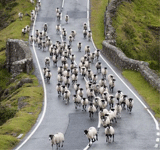| Chinese cuisine meets authentic African | |||||||||||
|
|||||||||||
//english.dbw.cn 2016-12-29 09:37:00 |
|||||||||||
 Local citizen enjoying Afro-Cantonese cuisine. [Photo: Global Max Media Group] By Andrew Ngozo for Global Max Media Group South Africa has always been known as the melting pot of cultures. These are not only indigenous African cultures but [they] include many that have been infused into the local scene by various peoples from across the world. Chinese immigrants have been on the South African social and economic fibre for more than a century. While mindful of their Chinese origins, South African Chinese have knit themselves well into the African being, culture and all. Although it was not easy, the Afro Cantonese cuisine was born; firmly embedding one into the other and vice versa. It is in this vein that today I have chosen to explore this special blend of cuisine and how it came to be a favourite of many Africans and Chinese. Afro-Cantonese cuisine is a blend of African ingredients and Chinese preparation methods. Chinese people have lived and cooked in South Africa for over a century. According to Chef Li, Afro-Cantonese cooking is now being augmented by the arrival of a new generation of Chinese cooks on African shores. He explained that Afro-Cantonese cuisine has its origins in the arrival of indentured mineworkers from Guangdong (formerly Canton) Province who came to Johannesburg in the 1890s. These workers returned home with such enticing tales of the city they called Gam Saam (Golden Mountain) that by 1940 there were approximately 8000 Cantonese people living, working, eating and cooking in South Africa. Said Li: “Apartheid and communism don’t mix, and the ancestors of these early immigrants found themselves cut off from their motherland for so long that an Afro-Cantonese cooking style developed. This food genre is characterised by a higher ratio of red meat to vegetables and a much gentler spicing than in classic Cantonese cuisine. It is thriving in South Africa today more than it has ever been.” Authentic Afro-Cantonese food can be eaten at Swallows Inn in central Johannesburg. Founded in 1938, it is rumoured that Nelson Mandela frequented this restaurant as a young lawyer and it still sells the Shanghai steak that the waiters swear was his favourite, Li shared. The neighbouring Yung Chen Noodle Den is a similar food history classic. Li said those who don’t like the fusion style of Afro-Cantonese cooking should rather head for the area that Johannesburg locals call ‘New Chinatown’ in Derrick Avenue, Cyrildene, where the restaurants are owned by chefs who arrived post 1994 and are consequently closer to their culinary roots. The chef offered more insights on places around South Africa where Afro Cantonese cuisine is offered to the general public. “When in Cape Town, the sizzle of the black bean pork at Jewel Tavern has long been a drawcard. Free State foodies rave about JC Chinese in Ladybrand. Durban’s China Plate offers all the usual suspects and some delicious dishes from the traditional menu,” he stated. Chinese takeaways fit the budget-conscious, whereas upmarket Chinese restaurants, like The Red Chamber in Hyde Park, Johannesburg are a little more costly. One should expect to pay around R250 per person for a three-course meal excluding wine. Chef Li concluded thus: “Although these Chinese establishments are mostly owned by Chinese, their clientele is not so much so. Their members of staff are largely an eclectic mix of South African Chinese and local people; all of whom are highly skilled in their respective fields. Many South Africans and Africans in general are frequent customers and most of them, at first, went there out of curiosity but were pleasantly surprised at the authentic mix of African and Chinese cuisine that staying away is simply impossible for most of them.” Adding Value to South Africa’s Health South Africa is a generally obese country. This journalist took time to visit a few Chinese establishments in the Menlyn area of Pretoria East. The intention was to find out the health efficacy of the meals offered at Chinese eating joints. I approached random customers and asked them the question: “How healthy is your Afro Chinese meal compared to that which is served at non-Chinese establishments?” The response that I got from across the board was synonymous. Pete van der Merwe, an accountant at one of the audit firms in the area, said, compared to local South African meals, Afro Chinese food had added to his longevity. “Most of the food that I have eaten in non-Chinese restaurants only serves to make you gain weight and slow you down. In short, my Afro-Chinese cuisine is a much better health option than the rest. So if anyone were to ask me, I would tell them that an Afro-Chinese meal per day adds one more year into your life,” said the 69 year old man who added that South Africa would be a less obese country if food establishments inculcated the Chinese culture into their food preparation and methods.  Chinese style pancake with African style gravy. [Photo: Global Max Media Group] |
|||||||||||
| Author: Source:CRI Editor:Yang Fan |
|||||||||||
 中文简体
中文简体










